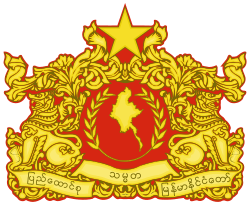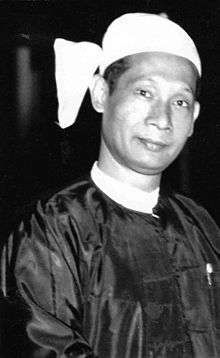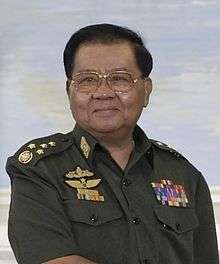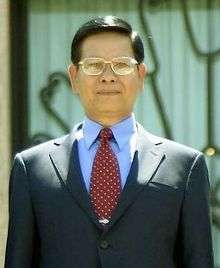Prime Minister of Myanmar
The prime minister of Myanmar was the head of government of Myanmar (also known as Burma) from 1948 to 2011.
| Prime Minister of Myanmar
မြန်မာနိုင်ငံတော် ဝန်ကြီးချုပ် | |
|---|---|
 | |
| Appointer | President of Myanmar |
| Formation | 4 January 1948 |
| First holder | U Nu |
| Final holder | Thein Sein |
| Abolished | 30 March 2011 |
| Succession | State Counsellor of Myanmar |
 |
|---|
| This article is part of a series on the politics and government of Myanmar |
|
|
Government
|
|
|
Related topics |
History of the office
The position of Prime Minister was created in 1948, with the adoption of the Burmese Declaration of Independence from the United Kingdom. Since then, eleven people have held the office (with two of them doing so on multiple occasions). Due to the country's long period of military rule, it has not been uncommon for the prime minister to be a serving (or recently retired) military officer.
The actual power of the prime minister has considerably varied over time, differing based on who holds the office. In 2004, a power struggle between the then–head of state, Senior General Than Shwe, chairman of the State Peace and Development Council, and his prime minister, General Khin Nyunt, resulted in the prime minister being dismissed and arrested.
The position was abolished on 30 March 2011, according to the current Constitution (adopted in 2008). It provided that the president is both the head of state and head of government. But after the 2015 general election, as Aung San Suu Kyi was constitutionally barred from becoming President, a position called State Counsellor, similar to Prime Minister, was established for her on 6 April 2016.
Prime ministers of Burma/Myanmar (1948–2011)
(Dates in italics indicate de facto continuation of office)
Union of Burma (1948–1974) | ||||||
|---|---|---|---|---|---|---|
| No. | Portrait | Name (Birth–Death) |
Term of office | Political party | ||
| Took office | Left office | Time in office | ||||
| 1 |  |
U Nu (1907–1995) |
4 January 1948 | 12 June 1956[lower-alpha 1] | 8 years, 160 days | Anti-Fascist People's Freedom League |
| 1 |  |
Ba Swe (1915–1987) |
12 June 1956 | 1 March 1957 | 262 days | Anti-Fascist People's Freedom League |
| (1) |  |
U Nu (1907–1995) |
1 March 1957 | 29 October 1958[lower-alpha 2] | 2 years, 242 days | Anti-Fascist People's Freedom League |
| 3 |  |
Ne Win (1911–2002) |
29 October 1958 | 4 April 1960[lower-alpha 3] | 1 year, 158 days | Military |
| (1) |  |
U Nu (1907–1995) |
4 April 1960 | 2 March 1962[lower-alpha 4] | 1 year, 332 days | Anti-Fascist People's Freedom League |
| (3) |  |
Ne Win (1911–2002) |
2 March 1962 | 4 March 1974 | 12 years, 2 days | Military / Burma Socialist Programme Party |
Socialist Republic of the Union of Burma (1974–1988) | ||||||
| 4 | .svg.png) |
Sein Win (1919–1993) |
4 March 1974 | 29 March 1977[lower-alpha 5] | 3 years, 25 days | Burma Socialist Programme Party |
| 5 | .svg.png) |
Maung Maung Kha (1920–1995) |
29 March 1977 | 26 July 1988[lower-alpha 6] | 11 years, 119 days | Burma Socialist Programme Party |
| 6 | .svg.png) |
Tun Tin (1920–2020) |
26 July 1988 | 18 September 1988[lower-alpha 7] | 54 days | Burma Socialist Programme Party |
Union of Burma/Myanmar (1988–2011) | ||||||
| 7 | .svg.png) |
Saw Maung (1928–1997) |
21 September 1988 | 23 April 1992[lower-alpha 8] | 3 years, 215 days | Military |
| 8 |  |
Than Shwe (born 1933) |
23 April 1992 | 25 August 2003 | 11 years, 124 days | Military |
| 9 |  |
Khin Nyunt (born 1939) |
25 August 2003 | 18 October 2004[lower-alpha 9] | 1 year, 54 days | Military |
| 10 |  |
Soe Win (1947–2007) |
19 October 2004 | 12 October 2007 (died in office.[4]) |
2 years, 358 days | Military |
 |
Thein Sein (born 1945) |
12 October 2007 | 30 March 2011 | 3 years, 169 days | Military (until 29 April 2010[5]) Union Solidarity and Development Party (from 8 June 2010[5]) | |
| 11 | ||||||
See also
- Myanmar
- Lists of Incumbents
Notes
- Resigned after the 1956 general election.
- Handed over power to the military.
- Handed back power to the civilian government after the 1960 general election.
- Deposed in the 1962 coup d'état.
- Removed from office due to the economic problems of the country.
- Resigned during the 8888 Uprising.
- Deposed in a coup d'état during the 8888 Uprising.
- Resigned due to health reasons.[1][2]
- Removed from office and placed under house arrest.[3]
References
- Wheeler, Ned (28 July 1997). "Obituary: General Saw Maung". The Independent. London.
- "Saw Maung Is Dead at 68; Led a Brutal Burmese Coup". The New York Times. 27 July 1997.
- "Burma's prime minister 'arrested'". BBC News. 19 October 2004.
- "Burma prime minister Soe Win dies". BBC News. 12 October 2007.
- Wai Moe (5 May 2010). "Tight Censorship on Reporting USDP". The Irrawaddy. Retrieved 22 August 2011.